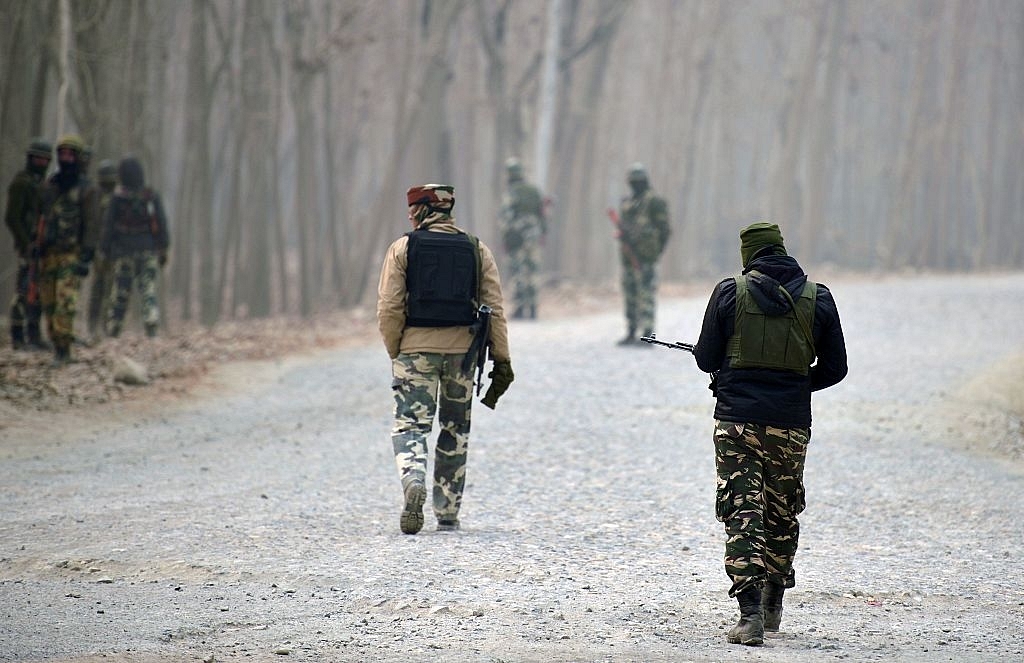Insta
India Calls Out UNHRC Bias On Kashmir; To No Longer Entertain Any Communication With Its Special Rapporteurs

Indian paramilitary troopers stand guard near the site of a gunbattle between suspected militants and Indian security personnel at Arwani Bijbehara, south of Srinagar, Kashmir. (Representative image) (TAUSEEF MUSTAFA/AFP/Getty Images)
Reacting to a report submitted by United Nations Human Rights Council (UNHRC) on allegations of human rights violations in Jammu and Kashmir, India has informed the international body that it will no longer respond to any communication with the HRC’s Special Rapporteurs, The Hindu reports.
The current Special Rapporteurs on Extrajudicial Executions, Torture, and Right to Health include Agnes Callamard, Dainius Puras and Nils Melzer. They had referred to June 2018 report of the Office of the High Commissioner of Human Rights (OHCHR). They contacted the Indian government in March this year, asking about the steps taken by the government to stop the alleged violations as pointed out by the report.
Ministry of External Affairs has clarified that India’s stand of snapping communications with the Special Rapporteurs was only for those wishing to refer to the OHCHR report. India had rejected the June 2018 report, and accused the High Commissioner of Human Rights Zeid Ra’ad Al Hussein of “clear bias”.
The Special Rapporteurs had also listed “13 cases of concern” from 2018 in which 8 people, including 4 children, were killed by security forces.
The Indian Permanent Mission to the UN in Geneva replied to the OHCHR on 23 April accusing the mandate-holders of “individual prejudice” and said that it does not intend to engage further with them.
UNHRC has been bearing the burden of accusations of bias. Last year, United States had pulled out of the council citing its anti-Israel bias. Nikki Haley, the US envoy to the UN, called it a "hypocritical" body that "makes a mockery of human rights".
The council has been criticised for its disproportionate focus on Israel-Palestine issue. In 2006, UNHRC made a review of alleged human rights abuses by Israel a permanent feature of every council session, while none of its other items deals exclusively with a specific conflict.
In the past, UN Secretaries General Kofi Annan and Ban Ki-moon, former president of the council Doru Costea have also accused the UNHRC of focusing disproportionately on the Israeli–Palestinian conflict.
UNHRC suffered huge blow to its credibility with several nations with questionable record serving on it, like China, Cuba and Saudi Arabia. The world’s worst violators of religious freedom according to the United States Commission on International Religious Freedom, including China, Nigeria and Pakistan are serving members of the council. Saudi Arabia, infamous for its misogynistic laws, is currently occupying key positions on the UN’s principal women’s rights bodies.
Since the council was set up, Israel has been condemned on most occasions while major incidences of human rights abuse in the world such as in Darfur, Tibet, North Korea, and Zimbabwe have not been discussed at the council. A 2008 report by Reuters pointed out that “Independent human rights groups say the council has fallen under the control of a bloc of Islamic and African states, usually back by China, Cuba and Russia, who protect each other from criticism”.
Support Swarajya's 50 Ground Reports Project & Sponsor A Story
Every general election Swarajya does a 50 ground reports project.
Aimed only at serious readers and those who appreciate the nuances of political undercurrents, the project provides a sense of India's electoral landscape. As you know, these reports are produced after considerable investment of travel, time and effort on the ground.
This time too we've kicked off the project in style and have covered over 30 constituencies already. If you're someone who appreciates such work and have enjoyed our coverage please consider sponsoring a ground report for just Rs 2999 to Rs 19,999 - it goes a long way in helping us produce more quality reportage.
You can also back this project by becoming a subscriber for as little as Rs 999 - so do click on this links and choose a plan that suits you and back us.
Click below to contribute.
Latest